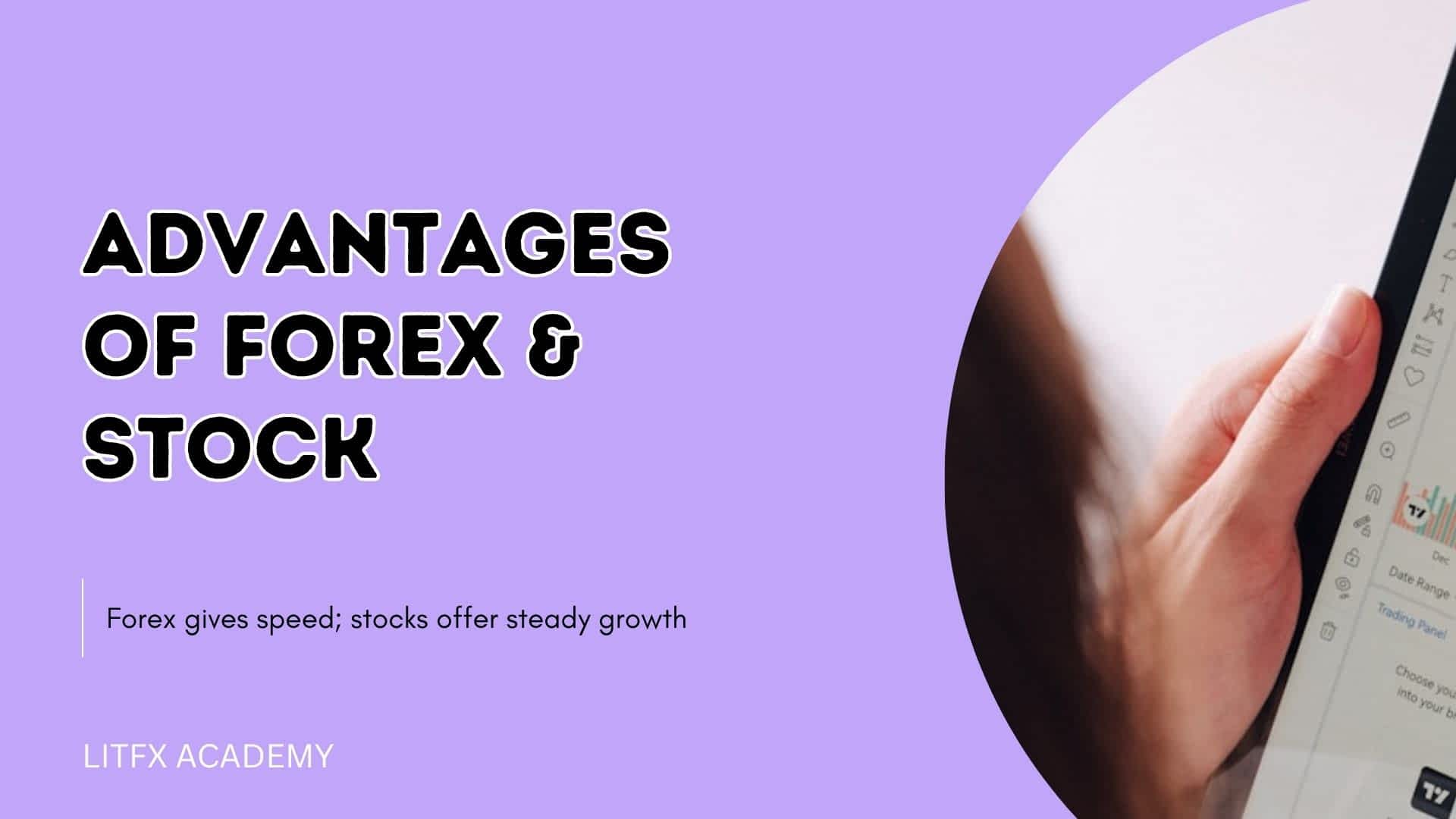Forex Trading vs Stock Trading
Jul 30
Hey there! Ever thought about making your money work harder for you? In today's world, lots of folks are looking at different ways to grow their savings, and two big words you might hear are "Forex" and "Stocks." It can sound a bit complicated at first, like learning a new language. But don't worry, we're going to break it all down in a super simple way.
Imagine you have two avenues to grow your savings. One lets you buy small pieces of famous companies. The other lets you trade world currencies every hour of the day. Which path should you choose?
I’ve spent years studying both markets, helping beginners learn simple yet powerful strategies. Here, I share that experience in a friendly, easy‑to‑read way. So lets start…..
Imagine you have two avenues to grow your savings. One lets you buy small pieces of famous companies. The other lets you trade world currencies every hour of the day. Which path should you choose?
I’ve spent years studying both markets, helping beginners learn simple yet powerful strategies. Here, I share that experience in a friendly, easy‑to‑read way. So lets start…..
What Is Stock Trading?
Let's start with something you might already know a little about: Stock Trading. When you trade "stock," you buy and sell shares of individual companies Tesla, Samsung, or Unilever. Owning a share means owning a piece of that business. If the company grows and does well, its share price often rises.
How do you make money with stocks? Well, usually in two main ways:
How do you make money with stocks? Well, usually in two main ways:
- When the company does well: If the company grows, invents cool new things, or sells lots of products, more people want to own a piece of it. This pushes the price of its stock up. If you bought it low and sell it high, you make a profit!
- Dividends: Sometimes, very established companies share a small part of their profits with their stock owners. This is like getting a little thank-you payment just for holding their stock.
How Stock Trading Works
- Exchanges and Hours
Shares trade on exchanges like the New York Stock Exchange or London Stock Exchange. Trading usually happens during set hours, for example 9:30 AM to 4:00 PM local time.
- Supply and Demand
If more people want to buy a stock, the price goes up. If more sell, it goes down. Market makers help keep prices smooth by buying and selling from their own accounts.
- Dividends
Some companies share profits with owners through dividends. This adds extra income beyond price gains.
Groups of stocks, such as the S&P 500 or FTSE 100, track overall market health. Investors watch these to gauge general trends.
- Indices
Groups of stocks, such as the S&P 500 or FTSE 100, track overall market health. Investors watch these to gauge general trends.
Why Investors Choose Stocks
1. Ownership You own a part of real companies that make products you use every day.
2. Long‑Term Growth
Over decades, stock markets tend to rise. This makes them ideal for retirement or big goals.
3. Dividend Income
Regular payouts from profitable companies can boost returns.
4. Lots of information:
It's usually easy to find news and reports about big companies, so you can do your homework before buying their stock.
2. Long‑Term Growth
Over decades, stock markets tend to rise. This makes them ideal for retirement or big goals.
3. Dividend Income
Regular payouts from profitable companies can boost returns.
4. Lots of information:
It's usually easy to find news and reports about big companies, so you can do your homework before buying their stock.
What Is Forex Trading?
Now, let's talk about Forex Trading, which is short for "Foreign Exchange." This might sound a bit more complex, but don't worry, we already covered what forex is in our previous guide, it's actually something we all do, even without realizing it!
Have you ever traveled to another country? When you land, you probably exchange your home country's money for the money of the country you're visiting, right? That's Forex in action! You're swapping one currency for another.
It is the market where people buy and sell currencies like U.S. dollars, euros, and Japanese yen against each other.
Have you ever traveled to another country? When you land, you probably exchange your home country's money for the money of the country you're visiting, right? That's Forex in action! You're swapping one currency for another.
It is the market where people buy and sell currencies like U.S. dollars, euros, and Japanese yen against each other.
How do you make money with Forex?
You trade "currency pairs." For example, if you think the Euro (EUR) is going to get stronger compared to the US Dollar (USD), you might buy the EUR/USD pair. If you're right and the Euro goes up against the Dollar, you make a profit when you sell! If it goes down, you could lose money. It's all about guessing which way the currency "wind" is blowing.
But wait a minute. Forex isn’t just about predicting the market. It’s also about knowing every little bit about how it works, from reading trading charts the right way to following the best guidelines. You just need to stay focused and follow it with passion.
Things that make currencies move include:
But wait a minute. Forex isn’t just about predicting the market. It’s also about knowing every little bit about how it works, from reading trading charts the right way to following the best guidelines. You just need to stay focused and follow it with passion.
Things that make currencies move include:
- Big news from a country: Like a new government policy or a big economic report.
- Interest rates: If a country's bank raises interest rates, its currency might become more attractive.
- Global events: Wars, natural disasters, or even big sporting events can sometimes affect currencies.
How Forex Trading Works
1. Currency Pairs
Every trade involves two currencies. For example, if you trade the EUR/USD pair, you buy euros and sell dollars at the same time.
The price shows how much one euro costs in dollars.
The price shows how much one euro costs in dollars.
2. Pips and Price Moves
Forex prices move in tiny steps called pips. A pip often equals 0.0001 of the currency rate.
If EUR/USD moves from 1.1000 to 1.1005, that is a five‑pip change.
If EUR/USD moves from 1.1000 to 1.1005, that is a five‑pip change.
3. Spreads and Costs
The spread is the gap between the buy price and sell price. Brokers earn by charging a small spread or a commission.
Tight spreads keep trading costs low.
Tight spreads keep trading costs low.
4. Leverage
Brokers often offer leverage, such as 1:100. That means you can control $10,000 of currencies with just $100 in your account.
Leverage can boost profits but also magnify losses. Proper risk management is vital.
Leverage can boost profits but also magnify losses. Proper risk management is vital.
Why Traders Love Forex
- Round‑the‑Clock Access The forex market opens Sunday evening (GMT) and runs until Friday evening. As one major city’s session ends, another begins.
- Huge Liquidity Over $6 trillion trades daily. You can buy or sell almost any amount without big price shifts.
- Can start with less money: Many brokers let you start with as little as $50. With something called "leverage" (which we'll talk about safely in a bit), you can control a larger amount of money with a smaller deposit. This can make it more accessible for some people.
- Global Impact News about interest rates or economic reports in one country affects currency values everywhere.
Side‑by‑Side Comparison
| Feature | Forex Trading | Stock Trading |
| Trading Hours | Nearly 24 hours Monday–Friday | Set hours on weekdays |
| Initial Deposit | Often from $50 | Often from $500 or more |
| Number of Assets | Around 40 major and minor pairs | Thousands of company shares |
| Typical Volatility | Can swing quickly in minutes | Moves slower, over days or weeks |
| Leverage Available | High, up to 1:500 | Lower, varies by broker and region |
| Costs | Low spreads; rare commissions | Commissions plus fees; wider spreads |
| Ownership | No ownership—pure price speculation | Real ownership of company shares |
| Dividend Opportunities | None | Yes, from many companies |
| Market Influences | Global economics, central bank news | Company earnings, sector trends |
| Learning Curve | Fast basics, deep mastery | Research company fundamentals
|
Advantages of Forex Trading

1. Flexible Trading Hours
You can place a trade after your work or school hours. Early morning in Asia or late at night in America—the market is open.
2. Low Entry Requirements
4. Focused Learning on Currency PairsWith about forty main and minor pairs, you concentrate on a manageable set. You learn what drives each pair—interest rates, trade data, political events.
5. Powerful Leverage Options
Leverage amplifies your buying power. A $100 deposit can control $10,000 or more. Remember to set stop‑loss orders to manage risk.
You can place a trade after your work or school hours. Early morning in Asia or late at night in America—the market is open.
2. Low Entry Requirements
A small starting balance lets you learn with minimal risk. Micro‑accounts often require as little as $10.
3. High Liquidity Ensures Smooth Trading
3. High Liquidity Ensures Smooth Trading
Even large orders fill quickly without huge price jumps. This helps you enter and exit trades at fair prices.
4. Focused Learning on Currency PairsWith about forty main and minor pairs, you concentrate on a manageable set. You learn what drives each pair—interest rates, trade data, political events.
5. Powerful Leverage Options
Leverage amplifies your buying power. A $100 deposit can control $10,000 or more. Remember to set stop‑loss orders to manage risk.
Advantages of Stock Trading
Ownership with a Personal Touch
You feel connected to companies you believe in. If you love electric cars, you might own shares of a leading EV maker.
Steady Long‑Term Growth
Global markets rise over decades. This makes stocks a go‑to for retirement plans, college funds, and more.
Passive Income Through Dividends
Some firms share profits every quarter. Even if the stock price stays flat, dividends add up over time.
Diverse Industry Exposure
Want to invest in healthcare, technology, or consumer goods? With stocks, you build a portfolio across sectors you trust and understand.
Challenges with Forex trading
- Can be complex: Because you're dealing with whole countries' economies, it can feel a bit overwhelming at first to understand all the global news and reports that affect currency prices.
- Leverage can increase losses too: While leverage can help you start with less money, it also means your losses can be bigger if your trade goes wrong. It's like using a magnifying glass on both your wins and your losses.
- Fast-moving: Currency prices can change very quickly, which means you need to be quick to react and manage your trades.
Downsides to stock trading?
- Can be slow: Big gains often take a long time, sometimes years. It's not usually a "get rich quick" game.
- Requires company research: You really need to understand the companies you're investing in. This takes time and effort.
- Limited hours: Stock markets usually have specific opening and closing times, like a regular business day. If you have a day job, it can be tricky to trade during those hours.
- Can be affected by company specific news: A bad news story about one company can make its stock price drop, even if the overall market is doing well.
Real Stories from Traders
“I started Forex with $100 and turned it into $1,200 in three months,” says Lina, a part‑time nurse. She focused on EUR/USD and used simple trend‑following strategies. Consistent risk limits kept her losses small when news moved her against her positions.
“I bought shares of a green energy firm and held them for five years,” shares Raj, a school teacher. He reinvested dividends and saw his original investment double. He prefers the slower pace of stocks, balancing it with an emergency fund.
Getting Started Safely: Tips for Both
No matter which path you lean towards, or even if you want to try both, here are some super important tips to keep your money safe and help you learn smartly:Normal text.
1. Learn Before You Leap
This is the most crucial step! Don't just jump in. Read books, watch videos, take online courses. Understand the basics, the risks, and the strategies. Education is your best friend in the world of trading.
2. Start Small
When you're ready to put real money in, start with a tiny amount you're comfortable losing. Think of it as your learning budget. Don't bet the farm!
3. Practice with a Demo Account
Almost all online trading platforms offer "demo" or "practice" accounts. These are fantastic! You trade with fake money but in real market conditions. It's like a video game for trading, where you can make mistakes without losing actual cash. Practice until you feel confident.
4. Manage Your Risks
Never put all your eggs in one basket. Learn about "stop-loss" orders, which automatically close a trade if it goes against you too much. This helps limit how much you can lose.
5. Don't Chase Quick Riches
Trading is not a magic wand for instant wealth. It takes time, patience, and discipline. Be wary of anyone promising guaranteed huge returns.
Also, always be careful who you trust online. Here’s how to avoid forex scams before it’s too late.
Your Trading Journey Awaits
So, there you have it! We've taken a stroll through the exciting worlds of Forex trading and Stock trading. Both offer incredible opportunities to grow your money, but they do it in different ways and suit different styles.
The most successful traders aren't just lucky; they're informed, patient, and always learning. Your journey into the world of trading starts with a single step: getting smart about your options.
Happy trading, and may your financial future be bright!
Wondering if Forex is still profitable in 2025? The answer may surprise you.
The most successful traders aren't just lucky; they're informed, patient, and always learning. Your journey into the world of trading starts with a single step: getting smart about your options.
Happy trading, and may your financial future be bright!
Wondering if Forex is still profitable in 2025? The answer may surprise you.
Ready to Take the Next Step?
So, after learning the real differences between Forex and stock trading, you might be leaning toward Forex, and that’s an exciting move! But hold on—before you jump in, remember this: success in Forex doesn’t happen by luck. You need the right guidance, a clear plan, and strong foundational learning.
At LITFX Academy, led by expert trader Farrukh, we’ve designed complete Forex trading courses just for beginners like you. From the very basics to advanced strategies, our courses include live classes, Zoom sessions, and one-on-one mentorship programs to support you every step of the way.

LITFX Academy is the ultimate trading education platform, helping traders master Support & Resistance, refine risk management, and build confidence in the markets. Learn from real-world strategies, live coaching, and a thriving community of traders just like you!
Disclaimer: The content provided by LITFX Academy is for educational and informational purposes only. It does not constitute financial, investment, or trading advice. Trading involves risk, and past performance is not indicative of future results. Always do your own research and consult with a licensed financial professional before making any financial decisions.
Disclaimer: The content provided by LITFX Academy is for educational and informational purposes only. It does not constitute financial, investment, or trading advice. Trading involves risk, and past performance is not indicative of future results. Always do your own research and consult with a licensed financial professional before making any financial decisions.
© 2025 LITFX Academy. All Rights Reserved.
